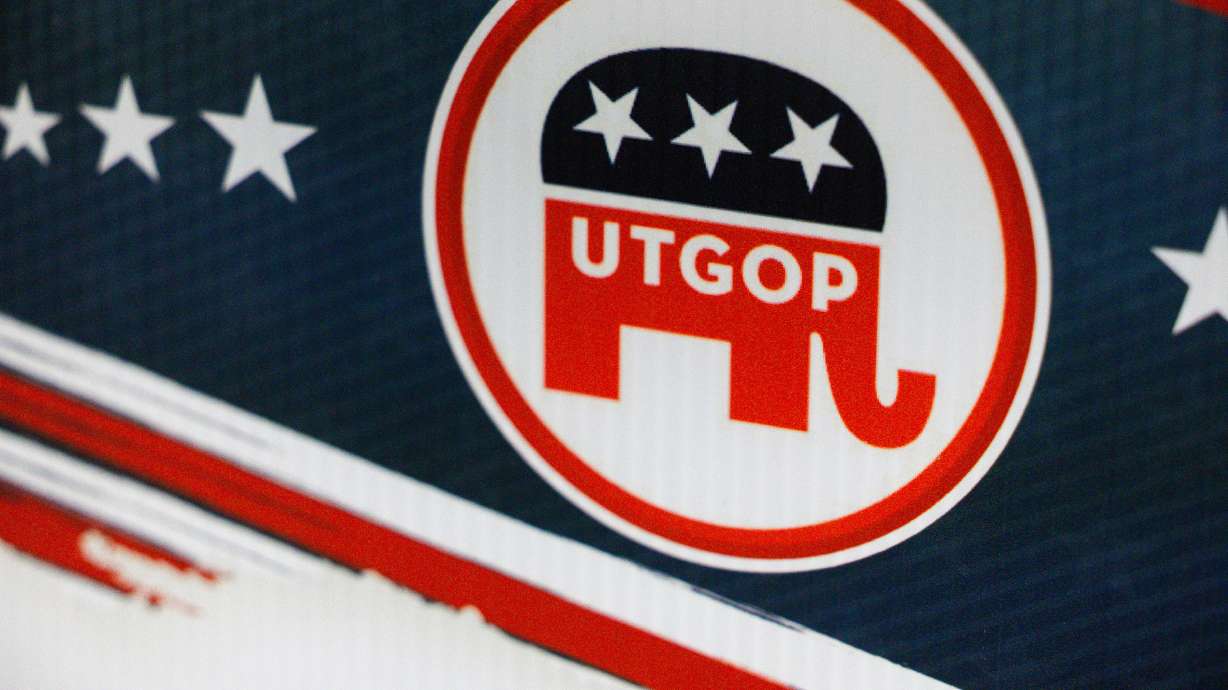Estimated read time: 4-5 minutes
- Utah GOP delegates will consider revoking party membership for candidates who use signature-gathering to qualify for the ballot.
- The proposed amendment targets candidates bypassing the caucus-convention path, possibly affecting top leaders.
- Chairman Rob Axson faces a leadership challenge from former state lawmaker and gubernatorial candidate Phil Lyman.
OREM — Utah Republican delegates will consider stripping party membership from candidates who opt to collect signatures to qualify for the primary ballot during the party's statewide organizing convention on Saturday.
A proposed amendment to the Utah Republican Party's constitution states that any Republican candidate who seeks office "by any mechanism other than that specifically provided within this constitution" is in violation of the constitution, "and that person's membership shall immediately be revoked for one year."
Utah law gives candidates two paths to qualify for the primary ballot — winning at convention or collecting signatures — but the GOP's constitution only mentions the caucus-convention path. Delegates have long sought to end the dual path to the ballot, with opposition to signature-gathering often seen as a litmus test for some of the most hardcore supporters.
The proposed change to the party's governing document is the latest attempt to oppose signatures. The change would also lower the threshold for advancing straight to the general election from the convention from 60% to 50%.
If approved by the several thousand GOP delegates, the change would impact many of the state's top leaders who gathered signatures: Gov. Spencer Cox, Sen. John Curtis, Rep. Blake Moore and a sizable number of Republicans in the Legislature, including House Speaker Mike Schultz.
Utah GOP Chairman Rob Axson didn't comment directly on the proposal but told KSL.com that he thinks a diversity of viewpoints is welcome within the party.
"I think there's more to be done together, working on our commonalities and building, than can ever be done in any type of purity tests," he said. "I believe the Utah Republican Party — it will be more successful and more principled by approaching politics more like a missionary trying to find converts rather than the Spanish Inquisition trying to purify the ranks."
Candidates chosen by the delegates have historically underperformed in Republican primary elections — gubernatorial candidate Phil Lyman and Senate candidate Trent Staggs are recent examples who lost their primary after winning at convention — and a new survey released by the Utah Foundation Wednesday found that the median Republican delegate is more conservative than the median GOP voter.
"In terms of issue priorities, Republican delegates place less importance on a few items like housing, roads and air quality, crime than Republican voters do," Shawn Teigen, the foundation's president, told reporters.
While delegates and voters were aligned on several issues when polled, delegates were more likely to support developing oil and gas extraction on Utah lands, more likely to oppose raising the minimum wage and more opposed to adding requirements for employers to offer paid parental leave.
The report also found that delegates from both the GOP and Democratic Party are slightly more pessimistic about the quality of life in Utah than their party counterparts.
"Both of our measures of kind of where the state is headed and how we're feeling now, delegates are feeling a little bit more negative than voters are," Teigen said.
Who will lead the Utah GOP?
There are no scheduled legislative, statewide, or federal elections this year, so aside from proposed changes to party bylaws and the constitution, Saturday's convention at the UCCU Center in Orem will be highlighted by the race to lead the state party for the next two years.
Axson was first elected chairman in 2023 after running unopposed, but this year he's being challenged by Lyman, a former state lawmaker who wants the party to take a more aggressive stance in the state.
"The Republican Party is the 800-pound gorilla in Utah, and we don't flex our muscle. We act like we're the subjects of the courts, of the Legislature," Lyman said during a debate in St. George last week. "I'm not about breaking laws — and I don't break laws — but I do challenge laws that need to be challenged, and we have to challenge those laws."
Lyman did challenge Utah's laws unsuccessfully last year, trying to have Gov. Spencer Cox thrown out of office. He was convicted of trespassing in 2015 after leading an ATV protest ride through an archaeologically sensitive canyon in southeastern Utah, for which he received a pardon from President Donald Trump.
"We should flex our muscles, and I think we do it far too little," Lyman added.
Axson points out that the Utah GOP is the second-largest organization in the state in terms of total membership behind The Church of Jesus Christ of Latter-day Saints, and he wants the party to be seen as a "unifying and principled" force in state politics. He previously served as a top aide to Sen. Mike Lee for years, so he identifies himself as "pretty darn conservative," but Axson said he prefers for the party to take a more collaborative tack.
"I'm not a bomb thrower," he said. "You don't see me calling people names, no matter how much I might disagree with them. That's never been my style. I personally feel life's too short for that."
He says he's proud of the work done over the past two years to attract younger conservatives to the party, work he hopes to continue over the next two years.









